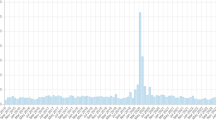Abstract
Clark and Chalmer’s conception of spatially extended memory is underpinned by an objectified conception of biological memory. To the extent that this can be identified with a ‘storage’ approach to memory, criticisms of it are well known and an alternative approach, perhaps more suited to an enactive account of cognition, might be one which focuses on remembering as a type of action. In the Otto story the objectification of memory is apparent not only in C&C’s characterization of the notebook but also in the notion that Inga’s memory is notebook-like. Insofar as Inga’s practices, or conceptions, of remembering might be notebook-like this should not be taken as evidence of the existence of an internal store, but could instead be the result of prior interaction with notebook-like artifacts.
Similar content being viewed by others
Notes
The question might be partially resolvable through historical research, building on existing work (e.g. Yates 1966; Carruthers 1990; Carruthers and Ziolkowski 2002), aimed at tracing links between technical innovation/artifact usage and popular conceptions of memory and memory practices. Highly speculatively, an additional avenue might be laboratory research measuring the effects of prolonged participation in document search tasks (versus e.g. recollection tasks using information presented verbally) on subsequent memory performance and strategy.
References
Adams, F., and K. Aizawa. 2008. The bounds of cognition. Sussex: Wiley-Blackwell.
Bakhurst, D. 2007. Vygotsky’s demons. In The Cambridge companion to Vygotsky, ed. H. Daniels, M. Cole, and J. Wertsch, 50–76. Cambridge: Cambridge University.
Ben-Ze’ev, A. 1986. Two approaches to memory. Philosophical Investigations 9(4): 288–301.
Ben-Ze’ev, A. 1996. The alternative to the storehouse metaphor. Behavioral and Brain Sciences 19: 192–193.
Carruthers, M. 1990. The book of memory. Cambridge: Cambridge University Press.
Carruthers, M., and J.M. Ziolkowski (eds.). 2002. The medieval craft of memory. Philadelphia: University of Pennsylvania Press.
Cazden, C.B. 1979. ‘Peekaboo as an instructional model: Discourse development at home and at school’. Papers and Reports in Child Language Development, no.17. Palo Alto, CA: Stanford University, Department of Linguistics.
Clark, A. 1989. Microcognition: Philosophy, cognitive science and parallel distributed processing. Cambridge: MIT Press.
Clark, A. 1997. Being there: Putting brain, body, and world together again. Cambridge: MIT Press.
Clark, A. 1998. Contribution to: Hooker, C.A., O’Brien, G., Quinn, N. et al., Being there: Review symposia. Metascience 7: 95–104.
Clark, A. 2003. Natural-born cyborgs: Minds, technologies and the future of human intelligence. Oxford: Oxford University Press.
Clark, A. 2008. Supersizing the mind: Embodiment, action, and cognitive extension. Oxford: Oxford University Press.
Clark, A. (2010). ‘Memento’s revenge: The extended mind, extended’. In: Menary, R. (ed. 2010), The extended mind, 43–66.
Clark, A., and D. Chalmers. 1998a. The extended mind. Analysis 58(1): 7–19.
Clark, A., and D. Chalmers, 1998b. ‘The extended mind’, slightly different version, accessed online at http://consc.net/papers/extended.html, 10.04.2012.
Clark, A., and R. Grush. 1999. Towards a cognitive robotics. Adaptive Behavior 7(1): 5–16.
Donald, M. 1991. Origins of the modern mind: Three stages in the evolution of culture and cognition. Harvard: Harvard University Press.
Hassabis, D., and E. Maguire. 2009. The construction system of the brain. Philosophical Transactions of the Royal Society. Series B: Biological Science 364(1521): 1263–1271.
Hegel, G.W.F. 1835. Hegel’s aesthetics vol.1 (trans. by T.M. Knox). Oxford: Oxford University Press, 1998.
Koriat, A., and M. Goldsmith. 1996. Memory metaphors and the real-life laboratory controversy: Correspondence versus storehouse conceptions of memory. Behavioral and Brain Sciences 19: 167–228.
Koriat, A., and M. Goldsmith. 1998. Methodological and substantive implications of a metatheoretical distinction: More on correspondence versus storehouse metaphors of memory. Behavioral and Brain Sciences 21: 165–168.
Malcolm, N. 1977. Memory and mind. Ithaca: Cornell University Press.
Marx, K. 1867. Capital–a critique of political economy, volume 1. Penguin edition, 1976.
Menary, R. 2007. Cognitive integration: Mind and cognition unbounded. Basingstoke: Palgrave Macmillan.
Michaelian, K. 2011. Is memory a natural kind? Memory Studies 4(2): 170–189.
Michaelian, K. 2012. Is external memory memory? biological memory and extended mind. Consciousness and Cognition 21: 1154–1165.
Neisser, U. 1996. Remembering as doing. Behavioral and Brain Sciences 19: 203–204.
Noë, A. 2004. Action in perception. The enactive approach to perception. Cambridge: MIT Press.
Rowlands, M. 1999. The body in mind: Understanding cognitive processes. Cambridge: Cambridge University Press.
Rupert, R.D. 2009. Cognitive systems and the extended mind. Oxford: Oxford University Press.
Ryle, G. 1949. The concept of mind. Chicago: University of Chicago Press.
Shanon, B. 1998. Metaphorical pluralism–not on the substantive level. Behavioral and Brain Sciences 21: 164–165.
Stern, D.G. 1991. Models of memory: Wittgenstein and cognitive science. Philosophical Psychology 4(2): 203–218.
Sutton, J. 1998a. Philosophy and memory traces: Descartes to connectionism. Cambridge: Cambridge University Press.
Sutton, J. 1998b. Contribution to: Hooker, C.A., O’Brien, G., Quinn, N. et al., Being there: Review symposia. Metascience 7: 90–95.
Sutton, J. 2009. Remembering. In The Cambridge handbook of situated cognition, ed. P. Robbins and M. Aydede, 217–235. Cambridge: Cambridge University Press.
Sutton, J. 2010. Exograms and interdisciplinarity: History, the extended mind, and the civilizing process. In The extended mind, ed. R. Menary, 189–225. Cambridge: MIT Press.
Toth, J.P., and R.R. Hunt. 1999. Not one versus many, but zero versus any: Structure and function in the context of the multiple memory-systems debate. In Memory: System, process, or function? ed. J.K. Foster and M. Jelicic, 232–272. Oxford: Oxford University Press.
Van Gelder, T., and R.F. Port. 1995. It’s about time: An overview of the dynamical approach to cognition. In Mind as motion: Explorations in the dynamics of cognition, ed. T. Van Gelder and R.F. Port, 1–43. Cambridge: MIT Press.
Varela, F.J., E. Thompson, and E. Rosch. 1991. The embodied mind: Cognitive science and human experience. Cambridge: MIT Press. Paperback edition, 1993.
Vygotsky, L.S. 1930. ‘The instrumental method in psychology’. In The collected works of L.S. Vygotsky: Volume 3: Problems of the theory and history of psychology, ed. R. van der Veer. New York: Plenum Press. Accessed online at: http://www.marxists.org/archive/vygotsky/works/1930/instrumental.htm (11/07/12).
Vygotsky, L.S. (1934). Thought and language. Revised edition (ed. & trans. A. Kozulin). Massachusetts: MIT Press. 1986.
Vygotsky, L.S. 1978. Mind in society: The development of higher psychological processes. Cambridge: Harvard University Press.
Vygotsky, L.S., and A.R. Luria. 1993. Studies on the history of behavior: Ape, primitive, and child. Hillsdale: Erlbaum. Original manuscript published 1930.
Wittgenstein, L. 1953. Philosophical investigations. Oxford: Basil Blackwell.
Wittgenstein, L. 1967. Zettel. Oxford: Basil Blackwell.
Wittgenstein, L. 1980. Remarks on the philosophy of psychology, volume 1, G.E.M. Anscombe, and G.H. von Wright (eds) translated by G.E.M. Anscombe, Chicago: University of Chicago Press.
Wood, D., J. Bruner, and G. Ross. 1976. The role of tutoring in problem solving. Journal of Child Psychology and Child Psychiatry 17(2): 89–100.
Yates, F. 1966. The art of memory. Routledge & Kegan Paul. Reprinted 2012, London: Pimlico.
Acknowledgments
The author thanks Kourken Michaelian, John Sutton, and one anonymous reviewer for their helpful comments and suggestions on earlier drafts of this paper.
Author information
Authors and Affiliations
Corresponding author
Rights and permissions
About this article
Cite this article
Loader, P. Is my Memory an Extended Notebook?. Rev.Phil.Psych. 4, 167–184 (2013). https://doi.org/10.1007/s13164-012-0123-2
Published:
Issue Date:
DOI: https://doi.org/10.1007/s13164-012-0123-2




